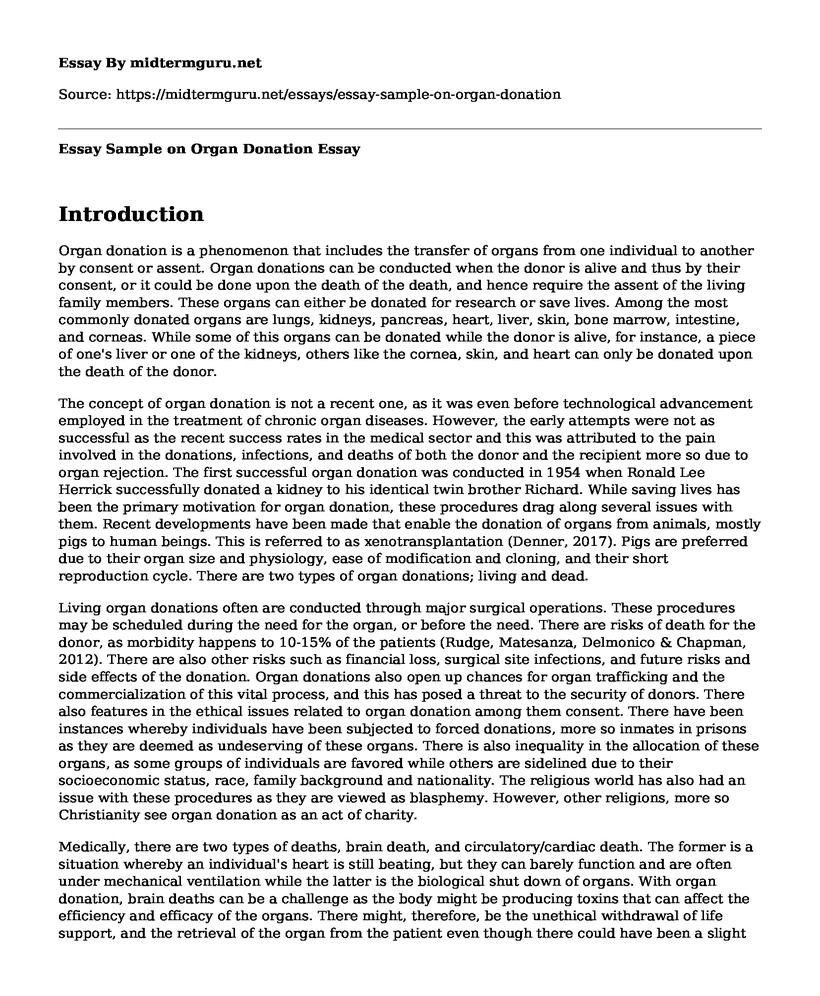Introduction
Organ donation is a phenomenon that includes the transfer of organs from one individual to another by consent or assent. Organ donations can be conducted when the donor is alive and thus by their consent, or it could be done upon the death of the death, and hence require the assent of the living family members. These organs can either be donated for research or save lives. Among the most commonly donated organs are lungs, kidneys, pancreas, heart, liver, skin, bone marrow, intestine, and corneas. While some of this organs can be donated while the donor is alive, for instance, a piece of one's liver or one of the kidneys, others like the cornea, skin, and heart can only be donated upon the death of the donor.
The concept of organ donation is not a recent one, as it was even before technological advancement employed in the treatment of chronic organ diseases. However, the early attempts were not as successful as the recent success rates in the medical sector and this was attributed to the pain involved in the donations, infections, and deaths of both the donor and the recipient more so due to organ rejection. The first successful organ donation was conducted in 1954 when Ronald Lee Herrick successfully donated a kidney to his identical twin brother Richard. While saving lives has been the primary motivation for organ donation, these procedures drag along several issues with them. Recent developments have been made that enable the donation of organs from animals, mostly pigs to human beings. This is referred to as xenotransplantation (Denner, 2017). Pigs are preferred due to their organ size and physiology, ease of modification and cloning, and their short reproduction cycle. There are two types of organ donations; living and dead.
Living organ donations often are conducted through major surgical operations. These procedures may be scheduled during the need for the organ, or before the need. There are risks of death for the donor, as morbidity happens to 10-15% of the patients (Rudge, Matesanza, Delmonico & Chapman, 2012). There are also other risks such as financial loss, surgical site infections, and future risks and side effects of the donation. Organ donations also open up chances for organ trafficking and the commercialization of this vital process, and this has posed a threat to the security of donors. There also features in the ethical issues related to organ donation among them consent. There have been instances whereby individuals have been subjected to forced donations, more so inmates in prisons as they are deemed as undeserving of these organs. There is also inequality in the allocation of these organs, as some groups of individuals are favored while others are sidelined due to their socioeconomic status, race, family background and nationality. The religious world has also had an issue with these procedures as they are viewed as blasphemy. However, other religions, more so Christianity see organ donation as an act of charity.
Medically, there are two types of deaths, brain death, and circulatory/cardiac death. The former is a situation whereby an individual's heart is still beating, but they can barely function and are often under mechanical ventilation while the latter is the biological shut down of organs. With organ donation, brain deaths can be a challenge as the body might be producing toxins that can affect the efficiency and efficacy of the organs. There might, therefore, be the unethical withdrawal of life support, and the retrieval of the organ from the patient even though there could have been a slight chance of recovery. Organ donation saves a lot of lives, and grants second chances to individuals, and therefore, by enforcing laws on the retrieval and consent of the organs, utility, and allocation, the future sure looks brighter.
References
Denner J. (2017). Advances in organ donation from pigs. Science journals. 357(6357). pp. 1238-1239. DOI: 10.1126/science.aao6334
Rudge C., Matesanza R., Delmonico F. L. & Chapman J. (2012). International practices of organ donation. British Journal of Anesthesia. 108 (1): p.48. Doi: 10.1093/bja/aer399
Cite this page
Essay Sample on Organ Donation. (2023, Feb 09). Retrieved from https://midtermguru.com/essays/essay-sample-on-organ-donation
If you are the original author of this essay and no longer wish to have it published on the midtermguru.com website, please click below to request its removal:
- Essay on Cell Phones and Their Impact on Health for Teenagers
- Essay on Professional Medical Ethics: Gender and Negotiation
- Addressing Low Literacy Level for Developing Effective Communication Regarding Health Information - Report Paper Example
- Addressing Nursing Shortage & Improving US Health Care - Essay Sample
- Animal Testing in Pharmacy - Essay Sample
- EBP Intervention: A Necessary Step Towards Addressing Mental Health Issues - Essay Sample
- A Career of Rigor: Nursing Demands Dedication & Compassion - Essay Sample







